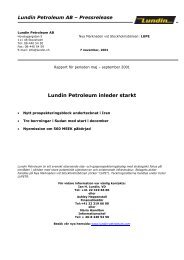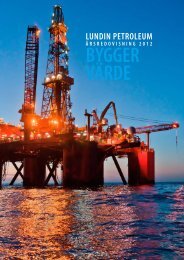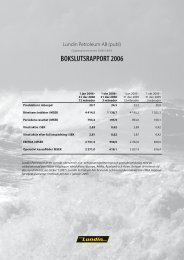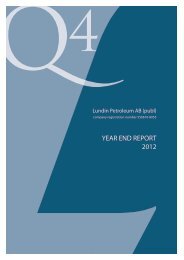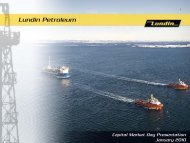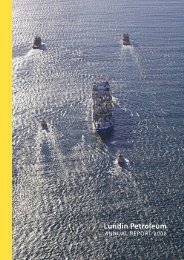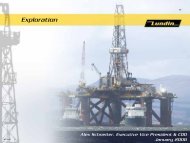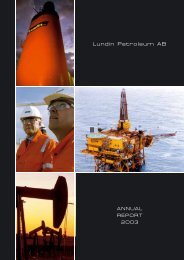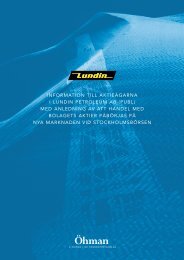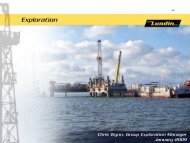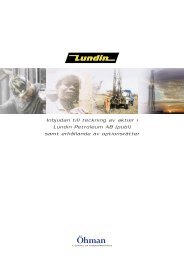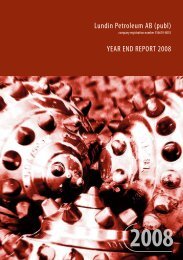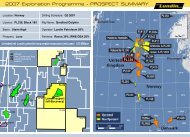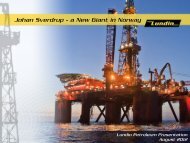Annual Report 2005 (6 MB) - Lundin Petroleum
Annual Report 2005 (6 MB) - Lundin Petroleum
Annual Report 2005 (6 MB) - Lundin Petroleum
You also want an ePaper? Increase the reach of your titles
YUMPU automatically turns print PDFs into web optimized ePapers that Google loves.
CORPORATE RESPONSIBILITY<br />
In view of the variety of operations within the Group, the diff erent<br />
locations and structures under which they are operated, either by<br />
Company staff , by service contractors or joint-venture partners,<br />
<strong>Lundin</strong> <strong>Petroleum</strong> receives diverse HSE data both on a monthly and<br />
ad hoc basis. The Key Performance Indicators (KPIs) reported on<br />
monthly that <strong>Lundin</strong> <strong>Petroleum</strong> uses for the Group’s operated assets<br />
are Fatalities, Lost Time Incidents (LTIs) as well as Oil Spills and Gas<br />
Leaks.<br />
KPI fi gures in themselves do not give a full picture on how operations<br />
are run; therefore monthly reports also include information regarding<br />
HSE training, drills, committee meetings, accident/incident/near<br />
miss reports with root cause analyses, other problems encountered,<br />
remedial measures put in place and initiatives undertaken to improve<br />
HSE performance. As a result, <strong>Lundin</strong> <strong>Petroleum</strong> corporate is well<br />
aware, at any given time, of the status of such issues in all operations<br />
and the areas which require closer surveillance or improvements.<br />
KEY PERFORMANCE INDICATORS (KPIs) IN <strong>2005</strong><br />
<strong>Lundin</strong> <strong>Petroleum</strong>’s HSE framework has been developed in order to<br />
be able to realise its “zero goal” for all its operations:<br />
■ Zero fatalities<br />
There were no Fatalities among Company staff or contractors in<br />
<strong>2005</strong>.<br />
■ Zero injuries<br />
The total Lost Time Incident Frequency Rate (LTIFR, per 200,000<br />
man hours) in operated assets in <strong>2005</strong> was 1.19; none of the incidents<br />
were of a serious nature.<br />
■ Zero oil spills or gas leaks<br />
There was one oil spill (9.25 bbls) constituting a reportable oil spill<br />
under Company rules within the operated assets.<br />
HSE ENHANCEMENT INITIATIVES IN <strong>2005</strong><br />
To achieve and enhance HSE performance requires continuous<br />
attention and the search for improvement measures. A number of<br />
steps were undertaken in <strong>2005</strong> with this objective in mind, among<br />
which:<br />
■ External auditing<br />
In <strong>2005</strong>, <strong>Lundin</strong> <strong>Petroleum</strong>’s operations and facilities in France,<br />
Tunisia and the UK were subjected to third party audits, in order to<br />
ascertain conformity with legal and Company standards and<br />
identify improvement areas (see third party report below).<br />
■ Training<br />
The Company is responsible for providing a safe working<br />
environment for its staff through adequate facilities,<br />
equipment and work procedures. However, overall HSE performance<br />
depends to a great extent on the competence and ability of the<br />
staff to carry out their tasks in a safe manner and in accordance<br />
with legal and Company rules. In order to underline staff ’s<br />
individual responsibility, the Company decided to introduce STOP<br />
training, a behaviour based observation programme which helps<br />
to change staff behaviour by enhancing their observation and<br />
communication skills in its operated areas.<br />
> 22 <<br />
■ Reducing environmental impacts<br />
The main steps to reduce possible adverse impacts on the<br />
environment are carrying out environmental impact assessments<br />
prior to the commencement of operations and having in place<br />
detailed environmental plans which deal with all potential<br />
impacts. Careful planning and effi cient use of the facilities can<br />
help achieve reduction goals. This was the case in the UK, which is<br />
<strong>Lundin</strong> <strong>Petroleum</strong>’s only current area of operations subjected to the<br />
Emissions Trading System (ETS) put in place by the Kyoto Protocol<br />
to the United Nations Framework Convention on Climate Change.<br />
<strong>Lundin</strong> Britain’s CO 2 emissions were well below its allowances.<br />
■ Monitoring of non-operated assets<br />
<strong>Lundin</strong> <strong>Petroleum</strong>’s fi rst and foremost concern is to ensure that it<br />
has a sound HSE system in place in the areas it operates; however,<br />
it is also concerned with HSE performance in non-operated areas. Joint<br />
venture partners are required to have an HSE framework in place<br />
and to demonstrate sound HSE practice. The Company requires<br />
monthly HSE reporting from those entities, in addition to ad hoc<br />
information in the event of an incident which has a detrimental<br />
impact on people, plant or the environment.<br />
STAKEHOLDER ENGAGEMENT IN <strong>2005</strong><br />
As a responsible corporate citizen, <strong>Lundin</strong> <strong>Petroleum</strong> is committed<br />
to foster positive relations with its stakeholders. This takes place<br />
throughout the operational cycle from the acquisition of an asset<br />
through to its abandonment.<br />
At the acquisition stage, once the Company has identifi ed a technically<br />
attractive asset it carries out an analysis of the sociopolitical context<br />
in which the operations would take place, identifying the main<br />
problems in the area, the extent to which operations would be<br />
aff ected by or contribute to these problems, and the measures to put<br />
in place to promote a positive outcome.<br />
In the course of operations, <strong>Lundin</strong> <strong>Petroleum</strong> - or, in the case<br />
of non-operated assets, its partners - is in contact with a variety<br />
of stakeholders, including host authorities, regulators, local<br />
communities, interest groups, etc. It maintains an open dialogue<br />
with anyone who has a legitimate interest in the area and wishes<br />
to cooperate in contributing to improving the status quo. In areas<br />
where there are particular socioeconomic problems, such as Nigeria,<br />
Sudan or Venezuela, the Company contributes and actively supports<br />
community development projects.<br />
At the abandonment stage, the Company meets with regulators<br />
as well as those to whom the property reverts to agree jointly on<br />
rehabilitation measures.<br />
In some instances there is limited interaction between <strong>Lundin</strong><br />
<strong>Petroleum</strong> and host communities, given that some of the activities<br />
occur off shore or are carried out through operators other than <strong>Lundin</strong><br />
<strong>Petroleum</strong>. The Board of Directors thus decided, at the end of <strong>2005</strong>, to<br />
set up a fund to enable <strong>Lundin</strong> <strong>Petroleum</strong> to contribute to projects in<br />
areas or fi elds where the Company has an interest, even if those areas<br />
are not directly impacted by the Company’s activities.



